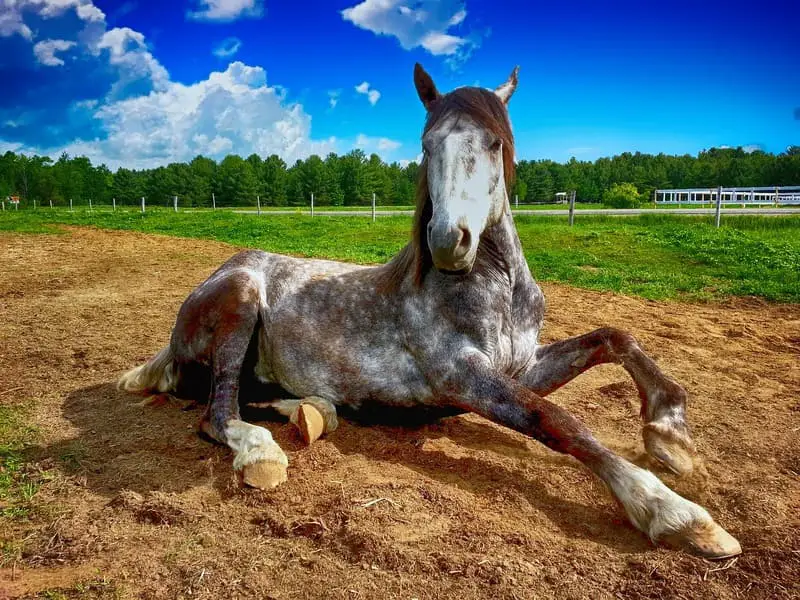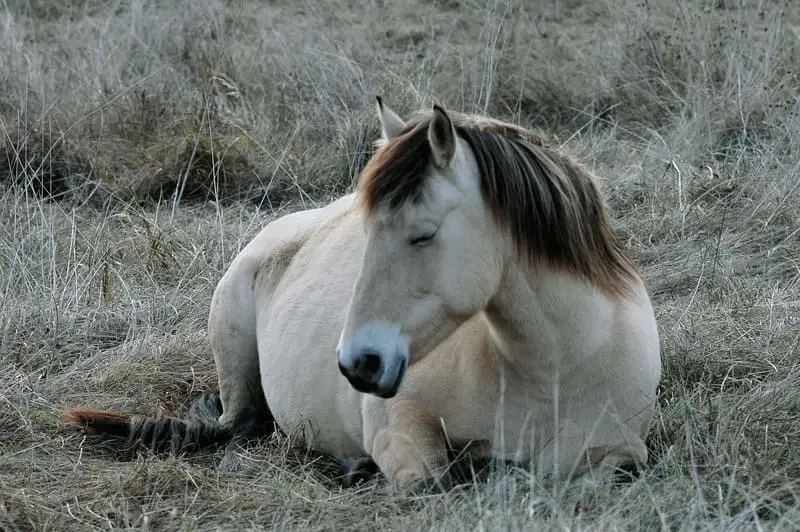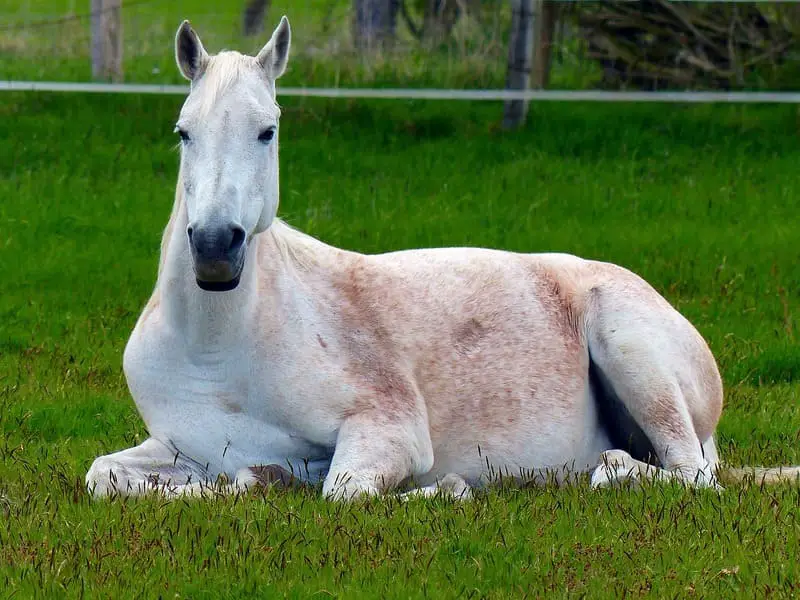Horses are known for their grace, strength, and majestic appearance, but they are also creatures of habit and necessity. One of the most intriguing behaviors of horses is their tendency to lay down, a posture that is quite unusual for such large animals. In this article, we will delve into the fascinating world of equine behavior to explore how often horses lay down, why they do it, and the significance of this behavior in their lives.

The Basics of Equine Lying Down
Lying down is an essential and natural behavior for horses. It serves several crucial functions, including rest, sleep, and recovery. Understanding the reasons behind this behavior and its frequency can shed light on the well-being and health of horses.
Rest and Sleep
One of the primary reasons horses lie down is to rest. Like all animals, horses need periods of rest to recover their energy and rejuvenate. Rest is especially important for horses that perform physically demanding tasks, such as those used in work or sports.
Horses typically rest lying down for shorter periods during the day or night. These short rests, also known as “sternal rests,” allow them to take the weight off their legs, relax, and restore their energy. During these resting periods, horses often have their head up and appear alert, as they are not in a deep sleep.
Deep Sleep
Horses also experience deep sleep, during which they may lie down completely. This deep sleep is essential for their physical and mental well-being. Unlike humans, horses can’t achieve deep sleep while standing, as it requires them to lie down on their side or in a recumbent position.
Horses experience deep sleep in short intervals, typically lasting for just a few minutes at a time. During deep sleep, their muscles relax, and their heart rate and respiration slow down. It’s a vital part of their sleep cycle, allowing them to rest and recover fully.
Physical Recovery
Lying down is essential for horses to recover from physical exertion and reduce the strain on their legs. When horses lie down, it helps distribute their body weight more evenly, alleviating the pressure on their limbs. This is particularly important for horses that engage in activities like jumping, racing, or carrying heavy loads.
Digestive Health
Horses are herbivores with a complex digestive system, and lying down can also aid in their digestion. When horses lie down, it can help facilitate the movement of ingesta (food) through their digestive tract. This is particularly relevant when horses are resting after a meal, as it can improve their digestion and overall health.
How Often Do Horses Lay Down?
The frequency with which horses lay down can vary depending on several factors, including their age, health, living conditions, and daily routines. Let’s explore these factors to gain a better understanding of how often horses lay down.
Age
Young foals and growing horses tend to lay down more frequently than adult horses. This is partly due to their rapid growth, which can be physically demanding. Young horses need more rest and sleep to support their growth and development. As horses age and reach maturity, their need for rest and sleep becomes more balanced.
Health
The health of a horse plays a significant role in determining how often they lie down. Ill or injured horses may lay down more frequently as they need extra rest to recover. Conversely, healthy horses that are well cared for tend to have a regular lying-down routine.
Living Conditions
The environment in which a horse lives can also influence how often they lay down. Horses that are kept in comfortable and safe environments are more likely to lie down regularly. Conversely, horses in stressful or uncomfortable conditions may have disrupted lying-down patterns.
Daily Routine
A horse’s daily routine, particularly their activity level, can impact how often they lie down. Horses engaged in strenuous work or exercise may need more rest and sleep to recover, leading to more frequent lying down. On the other hand, horses with a more sedentary lifestyle may lie down less frequently.
Season and Weather
Weather conditions and seasons can affect how often horses lie down. During extremely hot or cold weather, horses may adjust their lying-down patterns to find a more comfortable position. For example, they might lie down to cool off in hot weather or seek shelter during cold spells.
Social Hierarchy
In a herd setting, a horse’s position in the social hierarchy can influence their lying-down behavior. Dominant horses may feel more secure and comfortable lying down, while subordinate horses may be more vigilant and less inclined to rest in a recumbent position.
Individual Variability
Like humans, each horse is unique and may have its own lying-down patterns. Some horses may be more prone to lying down, while others may prefer to rest while standing. Individual preferences and needs can vary widely among horses.
Short Rests vs. Deep Sleep
It’s important to note that not all lying-down behavior in horses is indicative of deep sleep. As mentioned earlier, horses can have short rests in a sternal position, during which they do not enter a deep sleep phase. The frequency of deep sleep, during which horses lie down completely, is generally less than their total resting time.

The Dangers of Excessive Lying Down
While lying down is a natural behavior for horses and serves essential functions, excessive or prolonged recumbency can be a cause for concern. Horses are not anatomically designed to lie down for extended periods, as their large size and body weight can put pressure on their internal organs and limbs.
Colic
One of the most significant concerns associated with excessive lying down is colic, a common and potentially life-threatening digestive disorder in horses. Lying down for extended periods can disrupt the normal functioning of the digestive tract, leading to colic. Colic is a severe condition that requires immediate veterinary attention.
Pressure Sores
Prolonged recumbency can also lead to the development of pressure sores, particularly in areas where the horse’s body weight is concentrated. These sores can be painful and difficult to treat, making it essential to manage a horse’s lying-down behavior carefully.
Muscle and Joint Stiffness
Horses that lie down for prolonged periods may experience muscle and joint stiffness when they attempt to stand. This stiffness can affect their mobility and overall well-being.
Overexertion
Excessive lying down can be a sign of underlying health issues, such as lameness or fatigue. Horses that repeatedly lie down due to discomfort or pain may be overexerting themselves, which can exacerbate their condition.
Recognizing Normal Lying-Down Behavior
It is essential for horse owners and caretakers to be able to distinguish between normal and abnormal lying-down behavior in horses. Understanding what is typical for an individual horse and monitoring any changes in their lying-down patterns can be crucial for their well-being.
Typical Lying-Down Positions
Horses can adopt several positions when lying down. Some of the common lying-down positions include:
- Lying flat on one side
- Resting with their legs extended and their head flat on the ground
- Lying in a “sphinx” position, with their legs tucked beneath them
- Rolling from one side to the other
- Staying in a sternal position with their head up
Horses may switch between these positions during their rest periods. Observing a range of these positions is generally indicative of normal behavior.
Changes in Lying-Down Behavior
Any sudden or significant changes in a horse’s lying-down behavior should be investigated. If a horse that typically rests regularly begins to lie down less often or vice versa, it may be a sign of an underlying health issue. It is essential to consult with a veterinarian to rule out any potential problems.
Monitoring Resting and Deep Sleep
To assess a horse’s well-being, it’s helpful to differentiate between resting and deep sleep periods. Horses can achieve deep sleep in a lateral recumbent position, during which they may snore, twitch, or exhibit REM (rapid eye movement) sleep. Ensuring that horses have the opportunity for deep sleep is vital for their overall health.
The Importance of Adequate Rest for Horses
Adequate rest is essential for the overall well-being of horses. Insufficient rest can lead to health problems, decreased performance, and compromised quality of life. Here are some of the key reasons why horses need sufficient rest:
Physical Recovery
Rest and sleep are essential for horses to recover physically from daily activities. Horses that engage in strenuous work or exercise require sufficient rest to alleviate the strain on their muscles and joints.
Mental Well-Being
Rest also contributes to the mental well-being of horses. Adequate rest helps reduce stress and anxiety, allowing horses to maintain a calm and balanced temperament.
Digestive Health
Horses have a complex digestive system that relies on adequate rest to function correctly. Resting after eating helps horses digest their food more efficiently, reducing the risk of colic and other digestive issues.
Hoof Health
Horses that stand for prolonged periods are at a higher risk of developing hoof problems, such as laminitis. Resting allows horses to shift their weight, reducing the strain on their hooves.
Immune Function
Adequate rest supports a horse’s immune system. Horses that do not get enough rest may have weakened immune responses, making them more susceptible to illness.

Encouraging Healthy Lying-Down Behavior
Ensuring that horses have the opportunity for adequate rest is essential for their well-being. Horse owners and caretakers can take several steps to encourage healthy lying-down behavior:
Provide Comfortable Stalls
If horses are kept in stalls, it’s crucial to ensure that these enclosures are comfortable and clean. Stalls should be bedded with appropriate materials, such as straw or shavings, to provide a soft surface for horses to lie down on.
Offer Turnout
Allowing horses access to a pasture or paddock where they can move, graze, and lie down naturally is beneficial. Turnout provides horses with the opportunity to stretch, roll, and rest in a more natural setting.
Proper Nutrition
Feeding horses a balanced diet with appropriate forage is essential for their digestive health. Adequate nutrition supports their overall well-being, helping them rest and recover effectively.
Monitor Health
Regular health checkups and monitoring of a horse’s well-being can help detect any underlying issues that may affect their lying-down behavior. Early intervention is key to preventing potential health problems.
Social Interaction
Horses are social animals and thrive on interaction with other horses. Providing opportunities for socialization can reduce stress and encourage healthy lying-down behavior.
Adequate Exercise
Balanced exercise is crucial for maintaining a horse’s physical and mental health. It helps prevent excessive energy buildup and promotes rest and recovery.
Conclusion
Horses are fascinating creatures that engage in the natural behavior of lying down for rest, sleep, and recovery. How often horses lie down can vary depending on various factors, including age, health, living conditions, and daily routines. Understanding their lying-down behavior and recognizing changes in it is crucial for assessing their well-being.
Promoting healthy lying-down behavior in horses is essential to ensure their overall health and quality of life. Providing comfortable living conditions, access to turnout, proper nutrition, and social interaction can help horses get the rest they need to thrive. By paying attention to their individual needs and preferences, horse owners and caretakers can support their horses’ well-being and longevity.
In conclusion, while the frequency of horses lying down may vary, it is a behavior deeply ingrained in their nature and essential for their physical and mental well-being. Proper care and understanding of their needs are key to ensuring that horses can enjoy a healthy and restful life.
